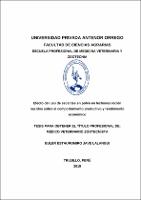Efecto del uso de secantes en polvo en lechones recién nacidos sobre el comportamiento productivo y rendimiento económico

View/
Download
(application/pdf: 665.0Kb)
(application/pdf: 665.0Kb)
Date
2020Author(s)
Jave Lalangui, Euler Estauromiro
Metadata
Show full item recordAbstract
El objetivo de este estudio es evaluar el efecto del uso de secantes en
polvo en lechones recién nacidos sobre el comportamiento productivo y
beneficio económico. Se utilizó 8 marranas en gestación y al momento del
parto se seleccionaron al azar 8 lechones machos, distribuidos mediante
un diseño al azar, con dos tratamientos sin polvo secante (TSPS) y con
polvo secante (TCPS) con ocho bloques, el factor de bloqueo fue el peso
de los animales al nacimiento, teniendo en cada unidad experimental
cuatro animales. Los resultados de las variables productivas fueron
analizados a través de un análisis de varianza y los promedios
comparados a través de la prueba de Tukey. Durante los 21 días de
experimento, la mejor ganancia diaria de peso y conversión alimenticia
(P<0.05) se obtuvo en los animales que recibieron el polvo secante al
momento de nacer. La mayor rentabilidad se obtuvo usando el polvo
secante al momento del destete, Consolidando los resultados, concluimos
que la adición de polvo secante en lechones recién nacidos mejora el
comportamiento productivo y beneficio económico. The objective of this study was to evaluate the effect of microencapsulated
sodium butyrate added in the diet of guinea pigs (Cavia porcellus) from 15
to 60 days of age on the productive behavior and economic benefit of the
breeding. We used 80 male guinea pigs weaned at 15 days of age with an
average weight of 340g which were distributed by a completely
randomized block design, with four treatments (0%, 0.05%, 0.10%, 0.15%)
and five blocks, the blocking factor was the weight of the animals at the
beginning of the experiment, with four animals in each experimental unit.
The results of the productive variables were analyzed through an analysis
of variance and the averages compared through the Tukey test. During the
45 days of experiment, the best daily weight gain and feed conversion (P
<0.05) was obtained in the animals that received food with
microencapsulated sodium butyrate. The highest profitability was obtained
with 0.05% inclusion dose of microencapsulated sodium butyrate in the
diet. Consolidating the results, we concluded that the addition of
microencapsulated sodium butyrate in the diet of guinea pigs from 15 to
60 days of age improves the productive behavior and economic benefit.
Collections
- Veterinaria y Zootecnia [196]

